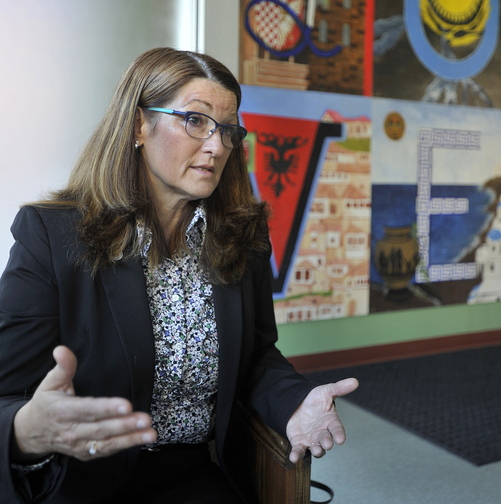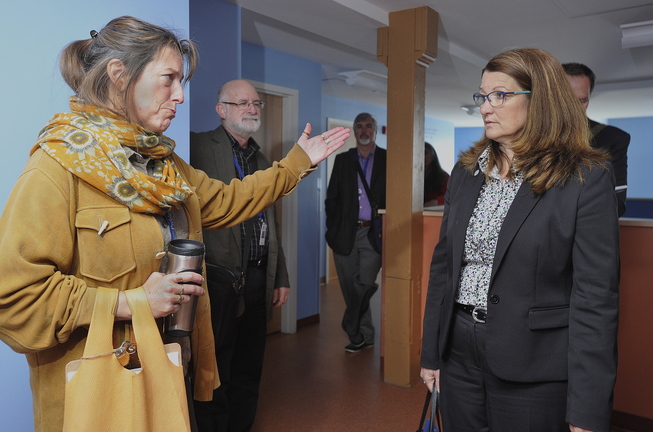The Obama administration’s top official dedicated to ending homelessness is in Portland this week to meet with administrators of shelters and speak at a conference on homelessness and the lack of affordable housing.
As executive director of the U.S. Interagency Council on Homelessness, Barbara Poppe is responsible for administering Opening Doors, the nation’s first comprehensive homelessness prevention plan. The Portland Press Herald interviewed her Tuesday as she visited the Joe Kreisler Teen Shelter, at 38 Preble St.
Q: Portland is experiencing record rates of homelessness. Is this happening in other cities, too? Why or why not?
A: Across the country, we’re seeing some places that are experiencing increases in the numbers of people experiencing homelessness, and in other cities, we’re actually seeing declines in it. … We know, globally across the country, we’re seeing reductions in the numbers of veterans experiencing homelessness. We’ve seen a reduction in the numbers of those experiencing chronic homelessness across the country, and we’ve seen the rate of family homelessness stay relatively steady across the term of our administration. But that varies greatly by community. … What you’re experiencing here in Portland is, you are seeing an increasing number of single adults in the overflow setting, and that kind of backs up the sheltering system, and so you end up with a number of folks who are really long-term stayers in the shelter with no way to exit the sheltering system. The other piece I just heard is you are seeing an increase in the number of young people experiencing homelessness, and even as this beautiful facility has been open, it’s not been able to serve all of the youth who’ve tried to stay here. So I think you have a serious situation that you’re experiencing here in Portland.
Q: Can you offer recommendations to our city officials for dealing with this problem?
A: One thing is to think about this as a statewide issue, and it’s in partnership with the federal government, as well as the local government. So we look at the issue of homelessness as one that’s going to take all of us working together to be able to solve it. So our recommendation is that as your mayor and your city and county governments grapple with the issue of homelessness, they are looking also at how they can partner with the state and the federal government. … We know in communities that have really tackled chronic homelessness, as they moved those individuals who had these long histories of homelessness and disability into permanent housing, it actually helps other populations, as well. So that you spend less dollars on overflow shelter because people are housed. What that frees up are resources that could be better used to address families. It makes it better possible to serve youth needs.
Q: What should shelters and other nonprofits do?
A: What makes a difference is when communities are using data to drive the results that they’re trying to obtain. So it’s important for all of the entities and nonprofits that are working on homelessness to be partnered around: How do we use data to measure our progress, to achieve the goals that we have set out and hold ourselves accountable? The second piece within that is the importance of all of the nonprofits that are delivering services to use evidence-informed practices. Use those lessons that have been learned across the country that’ll make a real difference. I’ve been working on the issue of homelessness for 30 years now, and many of the practices that we used over time didn’t make a whole lot of difference. They cost money. They didn’t make a lot of difference. And so what we’ve learned is what actually works, and the ways that you can get better results.
Q: What’s happening on the federal level to reduce chronic homelessness?
A: Our administration has been committed to a goal of ending chronic and veterans homelessness by 2015, and ending family, youth and child homelessness by 2020. We do this under a plan that’s called the Opening Doors plan, a federal strategic plan to prevent and end homelessness. Our work on chronic homelessness is very much aligned with our work on veterans homelessness, and unfortunately too many veterans experience long-term homelessness. And so our message and investment on veterans homelessness has been to expand the supply of permanent supportive housing available for veterans. We’ve made new investments in what’s called rapid rehousing for veterans. Preble Street has the grant that is used across the state under the Supportive Service for Veteran Families Program, which is the (U.S. Department of Veterans Affairs) rapid rehousing program. So these new investments, we believe, are really underlying the great progress we’ve made on veterans homelessness. … What we see as the opportunity for Maine is that you have a supply of permanent supportive housing that largely is not targeted to the problem of chronic homelessness. Just under 15 percent of admissions to permanent supportive housing in Maine are those who are chronically homeless. That number should be much closer to 100 percent. Across the country, the national average is more like 40 percent.
Q: Finally, what can the average person do to help with this problem?
A: The most important thing that ordinary citizens can do is … recognize that this is an issue that your community has to grapple with. And as you grapple with that, the first question is: What can I do to contribute to an end to homelessness and be committed to that? And I think there are many ways that individuals can do that. They can help out and volunteer through nonprofit organizations. They can be supportive as housing is opened in their neighbor(hood)s. … We’ve seen churches and synagogues and other religious groups come together and call for the kind of investment … and community support that’s necessary to make organizations successful, and to be a part, on a bipartisan basis, really advancing a positive agenda, that it is possible to end homelessness in our country.
J. Craig Anderson can be contacted at 791-6390 or at:
canderson@pressherald.com
Twitter: @jcraiganderson
Copy the Story LinkSend questions/comments to the editors.





Success. Please wait for the page to reload. If the page does not reload within 5 seconds, please refresh the page.
Enter your email and password to access comments.
Hi, to comment on stories you must . This profile is in addition to your subscription and website login.
Already have a commenting profile? .
Invalid username/password.
Please check your email to confirm and complete your registration.
Only subscribers are eligible to post comments. Please subscribe or login first for digital access. Here’s why.
Use the form below to reset your password. When you've submitted your account email, we will send an email with a reset code.